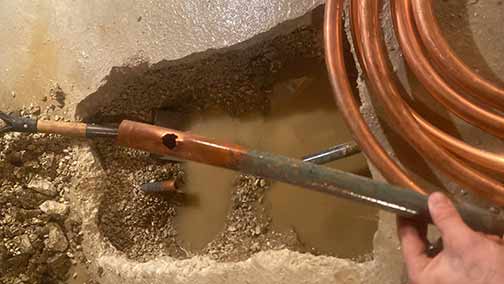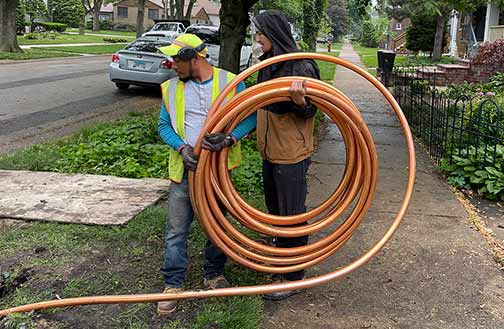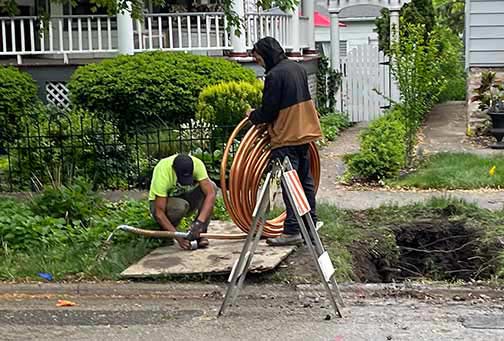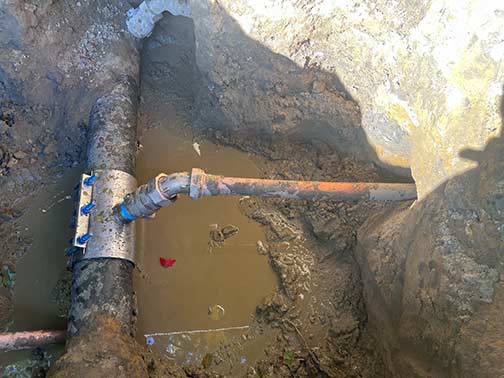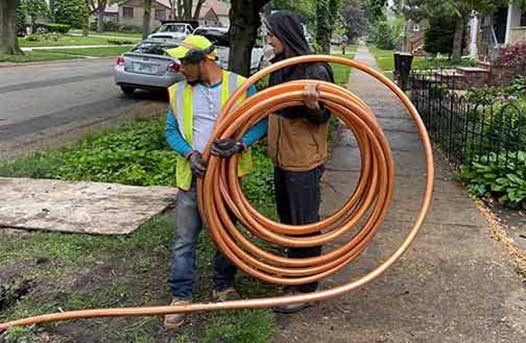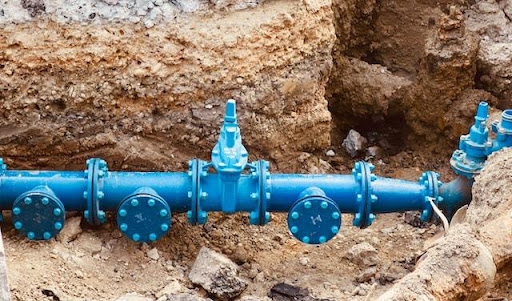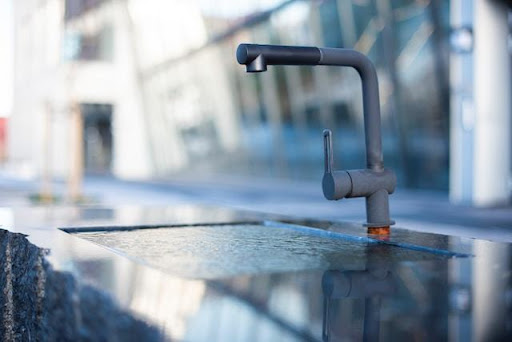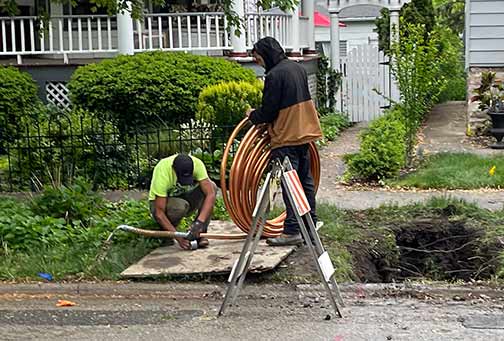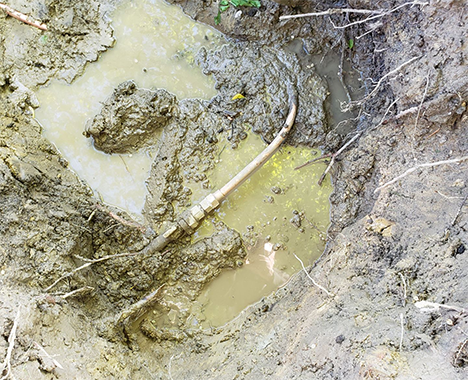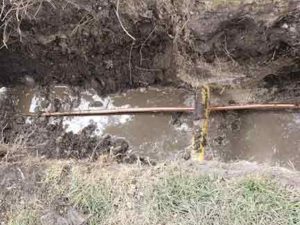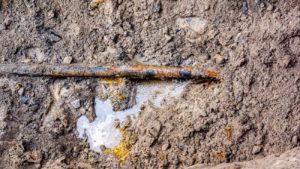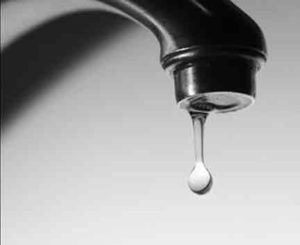Understanding the Importance of Your Main Water Line
Your main water line is a crucial component of your home’s plumbing system. It is responsible for delivering clean, potable water from the municipal supply to your household. A well-functioning main water line ensures that you have access to water for drinking, cooking, cleaning, and other essential activities. Given its importance, it is vital to maintain the integrity of your main water line and address any issues promptly.
Signs That It Might Be Time to Replace Your Main Water Line
Frequent Leaks and Repairs: A Persistent Problem
If you find yourself constantly dealing with leaks and repairs, it may be a sign that your main water line is deteriorating. Frequent issues can indicate that the pipe material is wearing out, and patching up leaks may only provide a temporary solution. In such cases, replacing the entire line might be more cost-effective and reliable in the long run. Regularly monitoring your plumbing system for leaks and addressing them promptly can help you avoid more significant issues down the line.
Visible Corrosion and Rust: Indicators of Aging Pipes
Corrosion and rust are clear indicators of aging pipes. If you notice rust-colored water coming from your taps, it is a sign that the interior of your pipes is corroding. This can lead to weakened pipes and potential burst water pipe emergencies, posing a risk to your home’s water supply and structural integrity. Rust and corrosion not only compromise the quality of your water but also weaken the structural integrity of your plumbing system, making it more susceptible to leaks and breaks.
Low Water Pressure: A Signal of Underlying Issues
Experiencing a sudden drop in water pressure can be a sign of a problem with your main water line. Blockages, leaks, or pipe damage can all contribute to reduced water flow. If you have ruled out other potential causes, such as issues with individual fixtures or appliances, it may be time to inspect your main water line for problems. Consistently low water pressure can be frustrating and may indicate that your plumbing system is struggling to deliver water efficiently.
Unusually High Water Bills: A Hidden Cost
A sudden spike in your water bill without a corresponding increase in usage can be a sign of a hidden leak in your main water line. Water escaping from a damaged pipe can lead to significant wastage and increased costs. Monitoring your water bills and investigating any unexplained increases can help you identify potential issues with your main water line. Addressing these issues promptly can save you money and prevent further damage to your plumbing system.
The Benefits of Replacing Your Main Water Line
Improved Water Quality: Ensuring Clean and Safe Water
Replacing an old, corroded main water line can significantly improve the quality of your water. New pipes are less likely to leach harmful substances into your water supply, ensuring that your water remains clean and safe for consumption. Improved water quality is essential for the health and well-being of your household, making it a worthwhile investment.
Enhanced Water Pressure: Restoring Optimal Flow
Installing a new main water line can restore optimal water pressure throughout your home. This can make everyday tasks, such as showering and washing dishes, more efficient and enjoyable. Improved water pressure can also benefit your appliances, helping them operate more effectively. Consistent water pressure is essential for the proper functioning of your plumbing system and can enhance your overall quality of life.
Reduced Risk of Future Repairs: A Long-Term Solution
By replacing your main water line, you can mitigate the risk of future leaks and repairs. New pipes are less prone to damage and wear, providing a more reliable and long-lasting solution. This can save you time, money, and stress associated with frequent plumbing issues. Investing in a new main water line is a proactive measure that can prevent unexpected plumbing emergencies and costly repairs.
Increased Property Value: An Attractive Selling Point
Upgrading your main water line can enhance the overall value of your property. Prospective buyers are likely to appreciate a well-maintained plumbing system and the assurance of a reliable water supply. Investing in a new main water line can be a selling point if you decide to put your home on the market. A modern and efficient plumbing system can make your property more attractive to potential buyers and increase its market value.

Investing in a new main water line can be a selling point if you decide to put your home on the market.
Expert Tips for Ensuring a Smooth Replacement Process
Hire a Qualified Professional: Ensuring Expertise and Precision
Replacing a main water line is a complex task that requires specialized knowledge and skills. It is essential to hire a licensed and experienced plumber to handle the job. A professional can accurately assess the condition of your existing line, recommend the best replacement options, and ensure that the installation is performed correctly and safely. Hiring a qualified professional can give you peace of mind and ensure a successful replacement process.
Obtain Necessary Permits: Compliance with Regulations
Before starting any work on your main water line, check with your local authorities to determine if you need any permits. Plumbing work often requires permits to ensure compliance with building codes and regulations. Your plumber can help you navigate the permitting process and ensure that all necessary documentation is in place. Obtaining the necessary permits is crucial for avoiding legal issues and ensuring that the work is done according to industry standards.
Plan for Temporary Water Disruption: Minimizing Inconvenience
Replacing your main water line will likely involve a temporary disruption to your water supply. Plan accordingly by storing enough water for essential activities, such as drinking, cooking, and hygiene. Communicate with your plumber to understand the expected timeline for the project and make arrangements to minimize inconvenience during the replacement process. Proper planning can help you manage the temporary disruption and ensure that your household’s needs are met during the project.
Regular Maintenance and Inspections: Ensuring Longevity
Once your new main water line is installed, it is essential to perform regular maintenance and inspections to ensure its longevity. Schedule routine check-ups with your plumber to identify any potential issues early and address them promptly. Proper maintenance can help extend the life of your main water line and prevent future problems. Regular inspections and maintenance are key to preserving the integrity of your plumbing system and avoiding costly repairs.
Additional Considerations for Main Water Line Replacement
Understanding Pipe Materials: Choosing the Right Option
When replacing your main water line, it is important to choose the right pipe material for your needs. Common options include copper, PVC, and PEX. Each material has its advantages and disadvantages, so consult with your plumber to determine the best choice for your specific situation. Factors to consider include durability, cost, and compatibility with your existing plumbing system. Selecting the appropriate pipe material is crucial for ensuring the longevity and efficiency of your new main water line.
Assessing the Scope of the Project: Planning and Budgeting
Replacing a main water line can be a significant undertaking, so it is crucial to assess the scope of the project before starting. Consider factors such as the length and location of the existing line, the condition of your property, and any potential obstacles that may impact the replacement process. A thorough assessment can help you plan and budget effectively for the project. Proper planning and budgeting are essential for ensuring a smooth and successful replacement process.
Environmental Impact: Opting for Eco-Friendly Solutions
Consider the environmental impact of your main water line replacement project. Opting for eco-friendly materials and methods can help reduce your carbon footprint and contribute to a more sustainable future. Additionally, proper disposal of old pipes and materials is essential to minimize environmental harm. Choosing environmentally friendly options can benefit both your household and the planet.
Insurance and Warranty: Protecting Your Investment
Check with your insurance provider to determine if your homeowner’s policy covers main water line replacement. Some policies may include coverage for plumbing issues, which can help offset the cost of the project. Additionally, inquire about warranties for the new pipes and installation work. A warranty can provide peace of mind and protect you from unexpected expenses in the future. Understanding your insurance coverage and warranty options is essential for safeguarding your investment.
To Conclude
Replacing your main water line is a significant decision that can have a lasting impact on your home’s plumbing system and overall value. By understanding the signs that indicate it might be time for a replacement, the benefits of upgrading your main water line, and expert tips for ensuring a smooth process, you can make an informed choice that best suits your needs. Investing in a new main water line can improve water quality, enhance water pressure, reduce the risk of future repairs, and increase your property’s value. With careful planning and the help of a qualified plumbing professional, you can ensure a successful and efficient main water line replacement project.

